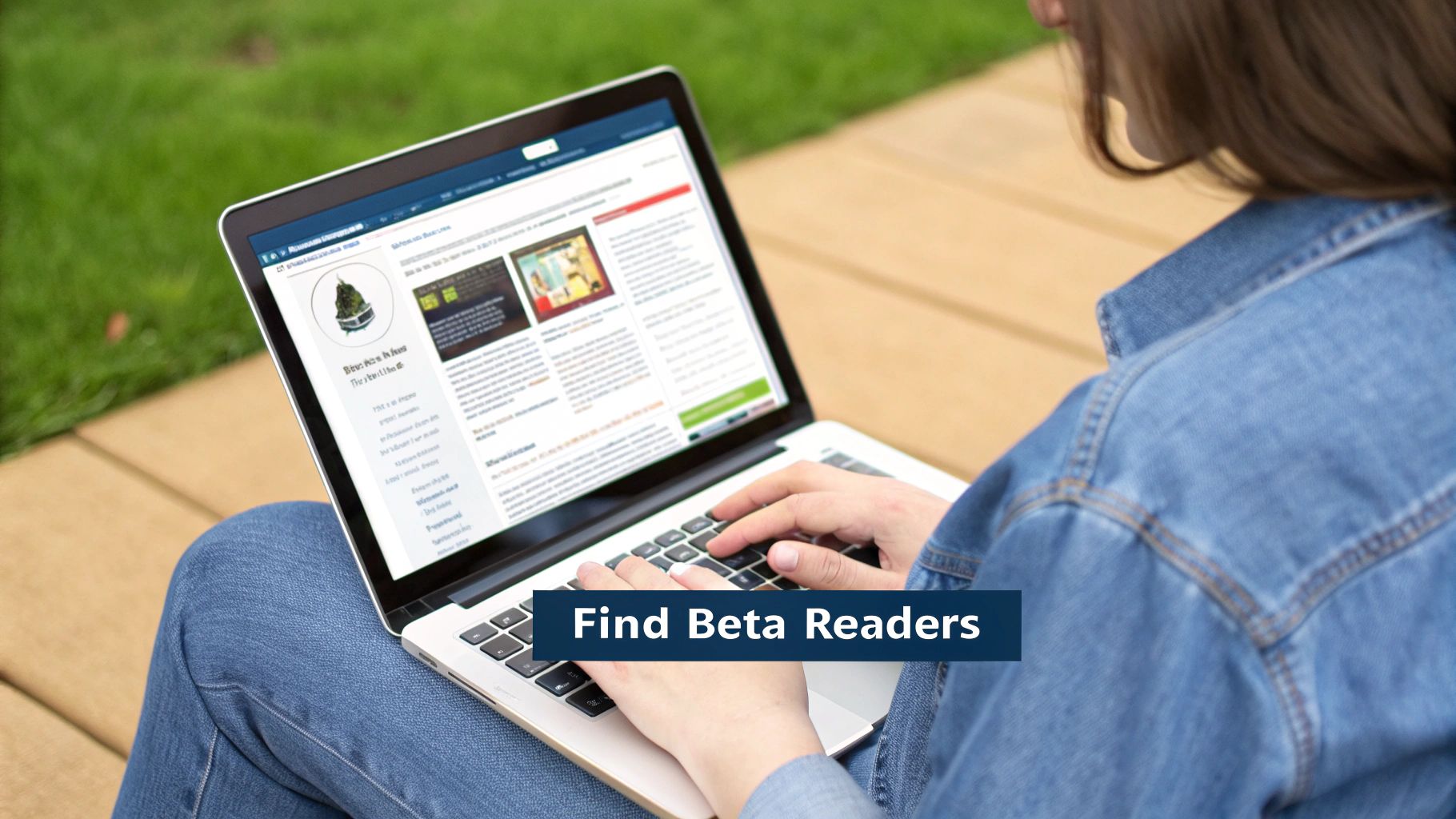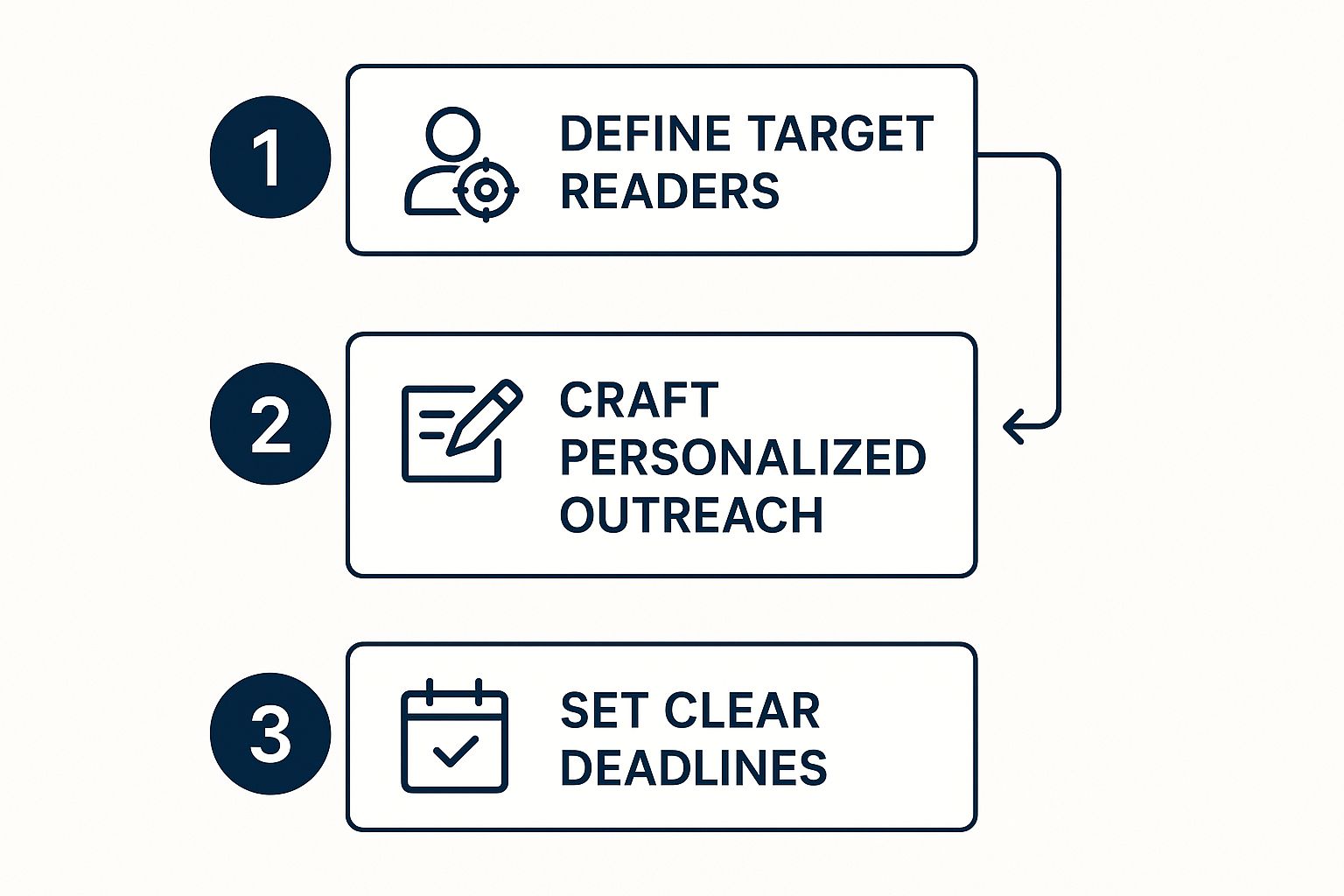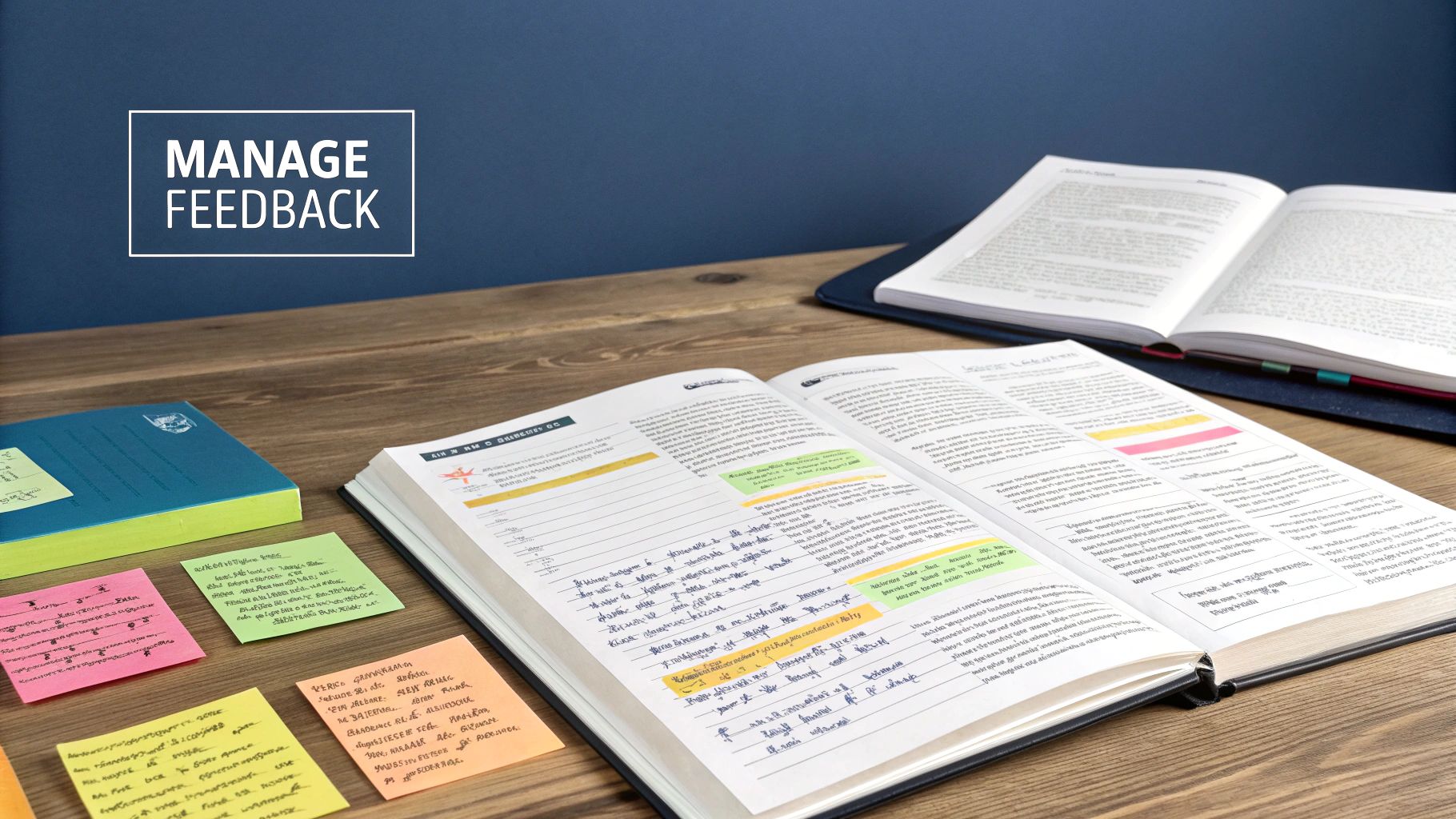Before you even think about finding beta readers, you need to understand why they’re so critical. Let's be honest—after months, maybe even years, buried in your manuscript, you lose all objectivity. You know the world and the characters inside and out. Beta readers don't. They’re your first real audience, and their fresh eyes are your secret weapon.
Why Beta Readers Are Your Manuscript’s Best Friend

When you're deep in the writing trenches, you develop blind spots. That shocking plot twist you’ve been planning for chapters? It might leave a new reader completely confused. The emotional climax that brings a tear to your eye? It could feel unearned to someone who isn't already invested.
This is where beta readers save the day. They’re the objective voice that can see the whole forest when you’re lost among the trees. Their job isn’t to fix your typos; it’s to give you a genuine reader’s reaction to the big-picture stuff.
They Spot the Cracks in Your Story
A good beta reader won't just say, "I liked it!" and call it a day. The truly helpful ones will dig in and point out the specific issues that could make a potential fan put your book down for good.
Their feedback usually highlights problems with core story elements:
- Plot Holes & Inconsistencies: They’ll catch that moment when a character's motivation makes no sense or when a timeline just doesn't add up.
- Pacing Problems: Is the opening a slog? Does the action in the middle drag? Does the climax feel like it’s over in a flash? They’ll tell you exactly where they got bored or felt rushed.
- Weak Character Arcs: A beta reader can tell you if your protagonist is actually compelling or just annoying, and whether their journey feels believable and satisfying.
Remember, beta readers are not a substitute for a professional editor. A developmental editor will help you untangle these story-level knots with an expert hand. Beta feedback is a crucial diagnostic step in the overall book writing process that happens before you pay for that polish, ensuring the story itself is solid.
A 2019 survey of authors highlighted just how essential this stage is. Most described beta readers as "a huge part of my process," valuing their unique ability to flag the blind spots that crop up after spending so long on a project. You can read more writer insights on the role of beta readers at JaneFriedman.com.
You Start Building Your Audience from Day One
Working with beta readers is your first real test run. It’s a chance to see how your story resonates with the very people you hope will one day buy it.
Their reactions—the parts they loved, the characters they couldn't get enough of, the questions that lingered—are priceless bits of market research. This feedback is what turns a decent draft into a book that truly connects with readers, setting you up for success long before publication day.
Finding Your Ideal Beta Reader

Before you even think about posting a "beta readers wanted" call, you need to know exactly who you're looking for. It’s tempting to grab the first person who volunteers, but trust me, that’s a rookie mistake. Finding the right readers is the secret sauce that can transform a good manuscript into a great one.
Think about it this way: not all feedback is helpful. The value you get is directly tied to the person giving it.
So, where do you start? Get crystal clear on your book's target audience. Are you writing a sprawling epic fantasy for readers who live and breathe intricate magic systems? Or is it a sweet, feel-good rom-com for someone who just wants a comforting escape after a long day? Your ideal beta reader is a member of that target audience.
A hardcore sci-fi fan won't be able to tell you if your Regency romance has the right amount of pining, just as a cozy mystery aficionado can’t tell you if your grimdark fantasy is, well, grim and dark enough. You need someone who gets the genre.
Crafting Your Reader Profile
I like to think of this as creating a character sketch for your perfect reader. This isn't about being picky for the sake of it; it's about being strategic. Knowing your ideal reader's traits is as important for an author as defining your ideal profile is for a business trying to find its customers.
Your profile should nail down a few key things. You're looking for someone who:
- Lives in your genre. They should already read and love books like yours.
- Has a critical eye. You don't want a cheerleader. You need someone who can explain why a scene feels flat, not just say they "didn't like it."
- Knows your niche. If you’re writing military sci-fi, a reader who understands that specific subgenre will give you far more insightful feedback than a general sci-fi fan.
The best beta readers are already part of your target audience. This is non-negotiable. Look for them where they already hang out—genre-specific Reddit communities, dedicated Facebook groups, or even local book clubs.
It's About Criticism, Not Compliments
Here’s a hard truth: your friends and family are probably the worst choice for beta readers. They love you! Their natural instinct is to tell you how wonderful your book is, which feels great but does absolutely nothing to improve your manuscript. They'll offer encouragement when what you really need is someone to point out that your entire second act drags.
What you're after is actionable feedback. A great beta reader doesn't just identify a problem; they give you clues about the cause.
Let's look at the difference.
| Unhelpful Feedback | Actionable Feedback |
|---|---|
| "I got bored in the middle." | "The pacing really slowed around chapter 15. The stakes didn't feel high enough to justify the hero's actions, so I lost interest." |
| "I didn't like the main character." | "The protagonist came across as too passive in the first act. I struggled to connect with their motivation for leaving home." |
See the difference? Your goal is to find someone who acts as a stand-in for your future paying reader, giving you an honest-to-goodness preview of how your book will be received. When you take the time to define this person first, finding them becomes a focused, targeted mission—not a desperate shot in the dark.
Where to Find Your Beta Reader Team
So, you've figured out who you're looking for. Now for the tricky part: where do you actually find these people? Your perfect beta reader team is out there, but you have to go where they hang out. It's like fishing—you don't cast a line in a puddle. You go where the fish are biting.
This whole process boils down to a few key steps: defining your ideal reader, personalizing your outreach, and being crystal clear about what you need from them.

As you can see, finding readers isn't just about posting a hopeful "anyone want to read my book?" message into the void. It’s a thoughtful approach that starts with clarity and respect for everyone's time.
Online Communities and Writing Platforms
Let's be real: the internet is your single greatest tool for finding beta readers, especially if you need people who are die-hard fans of your specific genre. These digital spaces are packed with avid readers and fellow writers who are actively looking to connect and help each other out.
Here are a few of the best places I've had success with:
- Goodreads Groups: An absolute goldmine. The "Beta Reader Group" on Goodreads is massive, purpose-built, and full of people ready to go. You’ll find thousands of members, clear posting rules, and dedicated threads organized by genre.
- Facebook Groups: A quick search for "beta readers," "critique partners," or your niche (like "Sci-Fi Writers & Readers") will turn up dozens of active groups. The communities are often lively and supportive, but always—always—read the group rules before you post.
- Scribophile: This platform is for writers serious about feedback. On Scribophile, you earn "karma" points by critiquing others' work, which you then "spend" to get your own manuscript reviewed. This system encourages detailed, high-quality feedback.
- Reddit: Subreddits like
r/BetaReadersare fantastic hubs for connecting authors and volunteers. I've also found amazing readers in genre-specific subreddits liker/fantasywritersorr/romanceauthors. The people there are incredibly passionate about their niche.
Finding the right platform can make all the difference. To help you choose, here’s a quick breakdown of some top options.
Top Platforms for Finding Beta Readers
| Platform | Best For | Cost | Key Feature |
|---|---|---|---|
| Goodreads | Authors seeking genre-specific readers from a large, established community. | Free | Massive, dedicated groups with clear rules and organized discussions. |
| Writers who want to connect within highly interactive, niche communities. | Free | Real-time interaction and a strong sense of community in genre-specific groups. | |
| Scribophile | Writers seeking in-depth, craft-focused feedback from other serious writers. | Freemium | A "karma" system that ensures you get feedback by giving it first. |
| Authors looking for dedicated volunteers in specific genres and sub-genres. | Free | Specialized subreddits (r/BetaReaders) with passionate, focused members. |
Ultimately, the best platform is the one where your target readers are most active. Don't be afraid to try a couple of them to see which one feels like the right fit for you and your manuscript.
Your Personal and Local Network
Don't overlook the potential of the people you already know. While you want to be careful with close friends and family who might struggle to be objective, your wider network could be hiding the perfect reader.
My Two Cents: You're looking for someone who loves your genre but isn't so close that they’ll hold back to spare your feelings. Think of that co-worker who devours thrillers, or a friend-of-a-friend who runs a local book club.
Tapping into these connections often leads to incredibly reliable readers because a foundation of trust already exists. At its heart, building your beta team is all about understanding the basics of how to start a community, even a small, temporary one focused on your book.
Consider reaching out to:
- Local Writing Groups: Check out Meetup or ask your local librarian about writers' circles. These are fantastic places to find critique partners who really get the nuts and bolts of storytelling.
- Genre-Specific Book Clubs: Find a book club that's all about your genre. By definition, these members are your target audience and are already pros at discussing books critically.
- Your Social Media Followers: If you’ve built even a small following on social media, put out a call. You might be shocked at how many people are genuinely excited to get a sneak peek and help shape your work.
Crafting a Compelling Beta Reader Request

The way you ask for help can make or break your beta reading process. A vague, rushed request is the quickest way to get crickets or, even worse, attract people who aren't a good fit. If you want dedicated beta readers, you need to write a request that's clear, enticing, and professional. It really sets the tone for the entire relationship.
I’ve learned to think of my request as a job posting. You're not just asking for a favor; you're recruiting a crucial team member for a short-term project. The goal is to give someone all the information they need to decide if they're the right person for your manuscript. This approach shows you respect their time and signals that you’re serious about making your book better.
The Anatomy of a Great Request
Your request has to be both informative and persuasive. Whether you're posting in a Goodreads forum, a Facebook group, or sending a direct message, there are a few key ingredients that should always be there. A well-structured post makes it so much easier for the right people to raise their hands and say, "Yes, I'm in!"
These are the non-negotiables I include in every request to get quality responses:
- A Clear, Intriguing Subject Line: Get straight to the point. Something like "Beta Readers Wanted for YA Fantasy Novel – The Crimson Compass" works perfectly.
- A Punchy Book Synopsis: This is your elevator pitch. Give them a short, exciting summary that hooks them without spoiling the best parts. Think of it as the blurb you'd see on the back of the book.
- Essential Manuscript Details: Always, always include your genre, any relevant subgenres, and the total word count. This helps readers immediately understand the time commitment.
- The Type of Feedback You Need: This is huge. Be specific. Are you worried about the sagging middle, a flat character arc, or a glaring plot hole? Telling them what you need help with attracts readers who excel at giving that kind of critique.
What to Include and Why
Going beyond the basics can really elevate the quality of your applicants. For example, I always include any potential content warnings (like graphic violence or mature themes). It’s an essential step to find readers who will be comfortable with your story and give you the best feedback.
It's also incredibly helpful to outline your timeline. A simple sentence like, "I'm looking for feedback within four weeks," manages expectations right from the start and weeds out people who can't meet your deadline. Trust me, this one detail prevents a ton of frustration down the road.
Remember, you are not just asking for a casual read-through; you are seeking specific, constructive criticism. A reader who knows you're looking for feedback on "whether the protagonist's motivation feels earned" will give much better notes than someone who only knows you wrote a thriller.
Here’s a practical example of how I might structure a post to attract the right kind of attention:
- Logline: A snappy, one-sentence hook.
- Synopsis: 2-3 short paragraphs to set the scene.
- Details: Sci-Fi Thriller, 95,000 words.
- Feedback Focus: "I'm specifically looking for feedback on the pacing in the second act and the believability of the antagonist."
- Timeline: "Requesting all feedback by October 15th."
- What You Offer: "In return, you'll receive a special mention in the acknowledgments and a free copy of the final ebook."
This level of detail shows you're organized and that you value their contribution. It frames the relationship as a professional exchange, which is exactly what it is.
While this stage is all about getting your manuscript polished, it's never too early to look ahead. Getting familiar with the entire publishing process, including details on how to publish an ebook, can make the journey feel much less daunting once your book is ready.
How to Manage the Beta Reading Process
https://www.youtube.com/embed/ukLnPbIffxE
You’ve assembled your dream team of beta readers and hit "send" on your manuscript. That’s a huge step! But the work is only half over. Now comes the real challenge: managing the incoming feedback without getting completely overwhelmed.
Honestly, this is where many authors drop the ball. Without a solid system, you risk drowning in a sea of conflicting emails, disorganized notes, and vague comments. A clear, structured process is your best friend here. It not only saves your sanity but also dramatically boosts the quality and usefulness of the feedback you get.
Set Clear Expectations and Deadlines
Before anyone even reads the first sentence, you need to set the ground rules. A friendly but professional kickoff email is the perfect way to get everyone on the same page from the start.
This initial message should clearly outline a few key things:
- The Deadline: Be specific. "Please send all feedback by November 15th" works much better than a vague "sometime next month." Give them a reasonable amount of time—3 to 4 weeks is a pretty standard window.
- The Feedback Format: How do you want to receive their notes? Tell them upfront if you prefer comments in a Google Doc, tracked changes in a Word file, or answers to a specific survey. This keeps everything consistent and easy to manage on your end.
- A Gentle Reminder: Briefly restate the key areas you need help with. A quick mention of "I'm especially interested in your thoughts on the pacing in the second act and whether the villain's motivation makes sense" helps focus their attention.
As you send out your work, remember that protecting your manuscript is crucial. It’s worth brushing up on secure document sharing practices to prevent your story from being shared without your permission. It’s a simple step that shows you take your work seriously.
Guide Their Feedback with a Questionnaire
If there's one tool that will transform your beta reading experience, it's a questionnaire. If you just ask for "general thoughts," you're likely to get unhelpful comments like, "I liked it!" or "The middle felt a bit slow." A good questionnaire pushes your readers to think critically about specific elements of your story.
Focus your questions on the big-picture issues that are keeping you up at night.
Here are a few examples to get you started:
- At what point, if any, did you feel bored or find your attention wandering? If you can remember the chapter, even better!
- Was the main character's goal clear to you early on? Did you find yourself rooting for them?
- Did the ending feel earned and satisfying? Or were there loose ends that left you feeling frustrated?
- Who was your favorite character and why? On the flip side, who did you connect with the least?
This targeted approach gives you comparable data from all your readers, making it much easier to spot recurring patterns and identify what’s truly working—and what isn’t.
I’ve found that a sweet spot for beta readers is usually between 3 and 7 people. This gives you a great mix of perspectives without becoming impossible to manage. Keep in mind that a lot of feedback is colored by personal taste, not just objective storytelling craft. That's why it's so important to find readers who can deliver constructive, actionable criticism.
When the feedback starts to arrive, take a deep breath. You’ll get praise, and you’ll get criticism. Thank every single reader for their time and effort, even if you disagree with some of their points. Learning to accept tough notes with grace is what separates an amateur from a professional who is truly committed to their craft.
Frequently Asked Questions About Beta Readers
Once you start thinking about beta readers, a lot of questions tend to pop up. It's totally normal. Getting a handle on these common concerns is the best way to move forward with confidence and build a great team for your book.
Let’s dig into some of the questions I hear most often from authors.
Should I Pay My Beta Readers?
My short answer? Probably not. The standard, long-standing tradition in the writing world is that beta reading is a volunteer gig.
Most people who raise their hands to beta read are either huge fans of your genre or they're writers themselves, looking to trade feedback. Their motivation is a sneak peek at a story they're excited about or the simple, communal joy of helping a fellow author.
Now, you can hire professional beta readers, but that's a different service entirely and not what most indie authors do. For your volunteer team, a thank you goes a long way. Think about offering:
- A heartfelt thank you and a special mention in your book's acknowledgments.
- A free copy of the final published book, whether it's an ebook or a paperback.
- An offer to return the favor and beta read for them down the road.
The real magic of the beta reading relationship comes from a shared passion for stories. Keeping money out of it usually preserves that dynamic, making the feedback feel more like genuine reader reaction and less like a paid transaction.
What Is the Difference Between Beta Readers and Critique Partners?
This is a big one, and it's so important to get right. While both critique partners (CPs) and beta readers give you feedback, they wear completely different hats.
A critique partner is almost always another writer. You're in the trenches together, trading manuscripts and giving deep, craft-focused feedback. You’ll talk shop about things like plot structure, character arcs, point of view, and the nitty-gritty of sentence construction.
A beta reader, on the other hand, steps into the shoes of your future audience. They read a polished, nearly-finished draft to tell you how it felt as a reader. They aren’t there to fix your prose; they’re there to tell you if the pacing lagged, if the plot twist landed, or if they fell in love with your main character.
How Do I Protect My Manuscript From Theft?
This is a fear every author has at some point. Handing your baby over to strangers can feel risky, but I can tell you that actual, malicious manuscript theft by beta readers is incredibly rare.
The best defense is simply being smart about who you invite. Don't just hand your manuscript to a random account with no history. Vet your readers. Stick to established platforms like Goodreads or Scribophile, where people have profiles and a reputation to maintain.
A simple step is to put a copyright notice on your title page—something like © Your Name 2024. All Rights Reserved. is perfectly fine. You could use a Non-Disclosure Agreement (NDA), but honestly, it often comes across as overly corporate and can scare off the very people you want to attract. A little trust in the community goes a long way.
Once you’ve used that fantastic beta feedback to polish your manuscript, your next thought will be getting it into readers' hands. When you're ready, check out our guide on how to promote your book to start planning your next steps.
Are you ready to turn your polished manuscript into a professionally published book? At BarkerBooks, we've helped over 7,500 authors achieve their publishing dreams. From expert editing and stunning cover design to global distribution, we handle every step of the journey. Let us help you share your story with the world. Explore our publishing packages today!
